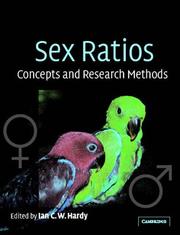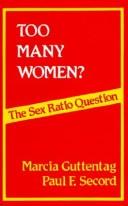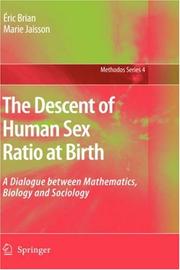| Listing 1 - 6 of 6 |
Sort by
|

ISBN: 9780511542053 9780521818964 9780521665780 0521818966 0521665787 0511055145 9780511055140 0511069936 9780511069932 0511170475 9780511170478 0511061471 9780511061479 0511542054 1280430516 9781280430510 0521818966 0521665787 9786610430512 6610430519 1107135591 9781107135598 1139146203 9781139146203 0511297548 9780511297540 Year: 2002 Publisher: Cambridge Cambridge University Press
Abstract | Keywords | Export | Availability | Bookmark
 Loading...
Loading...Choose an application
- Reference Manager
- EndNote
- RefWorks (Direct export to RefWorks)
Covering sex allocation, sex determination and operational sex ratios, this multi-author volume provides both a conceptual context and an instruction in methods for many aspects of sex ratio research. Theory, statistical analysis and genetics are each explained and discussed in the first three sections. The remaining chapters each focus on research in one of a wide spectrum of animal, plant and microbial taxa, including sex ratio distorting bacteria in invertebrates, malarial parasites, birds, human and other mammals, giving critical appraisals of such research. Sex Ratios: Concepts and Research Methods is primarily intended for graduate and professional behavioural and evolutionary ecologists in this field, but it will also be useful to biologists building evolutionary models, and researchers analysing data involving proportions or comparisons across phylogenetically related species.
Sex ratio. --- Sex determination, Genetic. --- Ratio, Sex --- Ratios, Sex --- Sex ratios --- Sex (Biology) --- Chromosomal sex determination --- Determination of sex, Genetic --- Genetic determination of sex --- Genotypic sex determination --- Sex --- Sex determination, Genetic --- Gene expression --- Sex chromosomes --- Sex determination --- Cause and determination

ISBN: 0412022117 9780412022210 9780412022111 0412022214 Year: 1993 Publisher: New York : Chapman & Hall
Abstract | Keywords | Export | Availability | Bookmark
 Loading...
Loading...Choose an application
- Reference Manager
- EndNote
- RefWorks (Direct export to RefWorks)
Haplodiploidy --- Haplodiploïdie --- Mannelijkheid [Indice van ] --- Masculinite [Taux de ] --- Sex ratio --- Insects --- Mites --- Insectes --- Genetics --- Evolution --- Reproduction --- Génétique --- Haplodiploidy. --- Acari --- Acarida --- Acaridea --- Acarina --- Arachnida --- Acarology --- Chromosome numbers --- Hexapoda --- Insecta --- Pterygota --- Arthropoda --- Entomology --- Genetics. --- Sex ratio. --- Evolution. --- Reproduction. --- Génétique --- Reproduction (Biology) --- Insects - Genetics. --- Mites - Genetics. --- Insects - Evolution. --- Mites - Evolution. --- Insects - Reproduction. --- Mites - Reproduction. --- Ratio, Sex --- Ratios, Sex --- Sex ratios --- Sex (Biology)

ISBN: 0803919190 0803919182 Year: 1983 Publisher: Newbury Park Sage
Abstract | Keywords | Export | Availability | Bookmark
 Loading...
Loading...Choose an application
- Reference Manager
- EndNote
- RefWorks (Direct export to RefWorks)
Sociology of the family. Sociology of sexuality --- #SBIB:316.346H20 --- #SBIB:316.356.2H2610 --- #SBIB:316.356.2H2630 --- Sex customs --- Sex ratio --- Women --- Sex role --- Feminism --- Ratio, Sex --- Ratios, Sex --- Sex ratios --- Sex (Biology) --- Positie van de vrouw in de samenleving: algemeen --- Rol en positie van de moeder --- Rol en positie van de vrouw/echtgenote --- History. --- Social aspects --- Social conditions. --- History --- Social aspects&delete& --- Social conditions

ISBN: 1283707713 1134724756 9786610567164 1280567163 020313396X 9780203133965 9780415158794 0415158796 9780415158800 041515880X 0415158796 041515880X 9781134724758 9781134724703 1134724705 9781134724741 1134724748 Year: 1998 Publisher: New York Routledge
Abstract | Keywords | Export | Availability | Bookmark
 Loading...
Loading...Choose an application
- Reference Manager
- EndNote
- RefWorks (Direct export to RefWorks)
Women who are dominant are more likely to have sons. Demographic studies show that more male children are born after wars, yet most people believe that their baby's sex is a matter of chance - determined by the father's sperm. Valerie Grant presents evidence that the mother's personality - which is related to female testosterone levels - can actually influence which type of sperm fertilises the egg.Using data from human and animal studies Valerie Grant discusses the implications for human evolution, developmental psychology and reproductive biology. Her claims are controversial and the imp
Sex determination, Genetic. --- Sex ratio. --- Dominance (Psychology) --- Pregnancy --- Human evolution. --- Testosterone. --- Mothers --- Androgens --- Evolution (Biology) --- Physical anthropology --- Evolutionary psychology --- Human beings --- Pregnant women --- Social hierarchy (Psychology) --- Control (Psychology) --- Social groups --- Ratio, Sex --- Ratios, Sex --- Sex ratios --- Sex (Biology) --- Chromosomal sex determination --- Determination of sex, Genetic --- Genetic determination of sex --- Genotypic sex determination --- Sex --- Sex determination, Genetic --- Gene expression --- Sex chromosomes --- Sex determination --- Psychological aspects. --- Psychology. --- Origin --- Psychology --- Cause and determination --- Human evolution --- Sex ratio --- Testosterone --- Psychological aspects --- Dominance (Psychology). --- Genetic sex determination

ISBN: 1280956631 9786610956630 140206036X 1402060351 9048175119 Year: 2007 Publisher: Dordrecht : Springer,
Abstract | Keywords | Export | Availability | Bookmark
 Loading...
Loading...Choose an application
- Reference Manager
- EndNote
- RefWorks (Direct export to RefWorks)
"Since the 18th century, one phenomenon, the proportion of the sexes at birth among human beings, has contributed to various developments such as the calculus of probabilities, administrative statistics, the moral and social sciences, the statistics of variability, post-Darwinian biology and Durkheimian sociology. This fact is brought to the critical attention of readers who rarely work together -- mathematicians, biologists, historians, social scientists and historians of the sciences -- along a three centuries European journey, meeting Süssmilch, Condorcet, Laplace, Fourier, Girou de Buzareingues, Poisson, Quetelet, Darwin, Düsing, Gini, Halbwachs or Fisher." "After a deconstruction of the past and present conditions of scientific understanding of human sex-ratio at birth, the authors are proposing a reconstruction of the dynamics of the phenomenon based on stochastics. This is an attempt in renewing our links with the oldest traditions of scholarly thinking, but too a kind of "well-tempered" reflexivity in today’s work of objectivization." "Appendixes get to the reader the first expression of a trend of the sex ratio at birth to adjust towards balance between the sexes by Condorcet in 1793-1794 ; a comparison of passages that Darwin devoted in 1871 and 1874 to similar issues ; and a sociological attempt of Halbwachs published in 1933.".
Sex ratio --- Demography. --- Research --- History. --- Mathematical models. --- Historical demography --- Social sciences --- Population --- Vital statistics --- Ratio, Sex --- Ratios, Sex --- Sex ratios --- Sex (Biology) --- Social sciences. --- Developmental psychology. --- Distribution (Probability theory. --- Social Sciences, general. --- Sociology, general. --- Gender Studies. --- History of Science. --- Probability Theory and Stochastic Processes. --- Methodology of the Social Sciences. --- Methodology. --- Distribution functions --- Frequency distribution --- Characteristic functions --- Probabilities --- Annals --- Auxiliary sciences of history --- Development (Psychology) --- Developmental psychobiology --- Psychology --- Life cycle, Human --- Behavioral sciences --- Human sciences --- Sciences, Social --- Social science --- Social studies --- Civilization --- Sociology. --- Sex (Psychology). --- Gender expression. --- Probabilities. --- Expression, Gender --- Sex (Psychology) --- Sex role --- Social theory --- Probability --- Statistical inference --- Combinations --- Mathematics --- Chance --- Least squares --- Mathematical statistics --- Risk --- Psychology, Sexual --- Sex --- Sexual behavior, Psychology of --- Sexual psychology --- Sensuality --- Psychological aspects

ISBN: 0691009813 Year: 2003 Publisher: Princeton (N.J.): Princeton university press
Abstract | Keywords | Export | Availability | Bookmark
 Loading...
Loading...Choose an application
- Reference Manager
- EndNote
- RefWorks (Direct export to RefWorks)
Animal genetics. Animal evolution --- Invertebrates --- 57.017.5 --- 575.18 --- 575.857 --- 591.551 --- Sex ratio --- Host-bacteria relationships --- -Invertebrates --- -Invertebrata --- Animals --- Bacteria-host relationships --- Relationships, Host-bacteria --- Host-parasite relationships --- Ratio, Sex --- Ratios, Sex --- Sex ratios --- Sex (Biology) --- Reproduction. Sex and sexuality --- Sex genetics. Genetic sex determination --- Population --- Relation between the sexes. Pairing (cohabitation) of sexes. Devices for location and recognition of the sexes by each other. Rut. Fighting among males, sparring. Courtship rituals --- Reproduction --- Genetics --- Host-bacteria relationships. --- Sex ratio. --- Genetics. --- Reproduction. --- -Reproduction. Sex and sexuality --- 591.551 Relation between the sexes. Pairing (cohabitation) of sexes. Devices for location and recognition of the sexes by each other. Rut. Fighting among males, sparring. Courtship rituals --- 575.857 Population --- 575.18 Sex genetics. Genetic sex determination --- 57.017.5 Reproduction. Sex and sexuality --- -Bacteria-host relationships --- Invertebrata
| Listing 1 - 6 of 6 |
Sort by
|

 Search
Search Feedback
Feedback About UniCat
About UniCat  Help
Help News
News